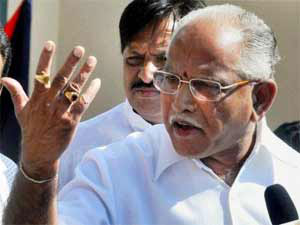Bengaluru, Aug 9: In a new turn to the tussle between senior BJP leaders B?S?Yeddyurappa and K S?Eshwarappa, the latter convened a meeting of leaders of the Kuruba community and also played the “Ahinda” card on Monday.
 Eshwarappa, who belongs to the Kuruba community, is cut up with Yeddyurappa for sidelining him while appointing office-bearers to the Shivamogga unit of the party.
Eshwarappa, who belongs to the Kuruba community, is cut up with Yeddyurappa for sidelining him while appointing office-bearers to the Shivamogga unit of the party.
Yeddyurappa has appointed S Rudre Gowda as the district president of the party. Gowda had contested as the KJP nominee against Eshwarappa in the 2013 Assembly elections.
Eshwarappa has been boycotting key meetings of the party to register his unhappiness. On Monday,?Eshwarappa convened a meeting to revive the Sangolli Rayanna Brigade, a registered but defunct social service organisation, apparently to send a message to Yeddyurappa that he cannot be taken for granted. Addressing the gathering, Eshwarappa said the brigade will take up district-wise enrolment drives soon. The brigade will not be restricted to the Kuruba community. Those belonging to minority, other backward classes and dalits can also enrol themselves with the brigade. It will hold a convention in Haveri during the third week of September, he said.
Political observers feel that?Eshwarappa is trying to play the Ahinda card (Kannada acronym for minorities, backward classes and dalits) and emerge as a leader of these communities and consolidate his position in the party.
Chief Minister Siddaramaiah, when he was in the JD(S), consolidated his position in politics by conducting Ahinda meetings. It paid him dividends as he emerged as an Ahinda leader.
Eshwarappa had recently complained to the party leadership against the style of functioning of Yeddyurappa. It is said that many party leaders including Bhanuprakash, Raghunath Rao Malkapure and Somanna Bevinamarad endorsed Eshwarappa's view before the party leadership.




Comments
They were due to meet leaders from across Burundi's political spectrum later Thursday before holding talks with civil society and religious leaders.
Mr. EshwarAPPA, Who will follow LOVE JIHAD ? ? ?
Dear INDIANS see how they fight with each other and you are following them Blindly.
Add new comment